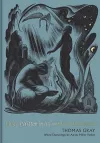
Elegy Written in a Country Churchyard (Collector's Edition)
Thomas Gray - Hardback
£16.99
Thomas Gray was born in London, in a house on Cornhill in the City of London, on 26 December 1716. His grandfather had been a successful merchant, but his father took up work as a money-scrivener - a loan-broker in modern parlance - and was not too successful. In fact, when his father died, the family was left in somewhat straitened circumstances. The younger Gray was however educated at Eton, where he was to meet young men who were to be important to him in later life, such as Richard West - subject of an Epitaph by Gray, and son of the Lord Chancellor of Ireland - and Horace Walpole - author of The Castle of Otranto and creator of the magnificent mock-Gothic house, Strawberry Hill - who was later to publish some of Gray's work. In 1734 Gray went up to Cambridge, and maintained a lengthy correspondence with West who was at Christ Church, Oxford. Both men decided that they would take up the Law; West entered the Inner Temple in 1738 and Gray intended to do likewise, but decided instead to accept Walpole's invitation to accompany him on his Grand Tour. Gray's pleasure at being involved in this enterprise was tempered by a significant falling-out between the young men, which occasioned the poet's return to England, and a lengthy estrangement between the two men. Gray's father passed away only shortly after his return from the Continent. Gray then returned to Cambridge and studied for a degree in Civil Law. It is hard to date Gray's real beginnings as a poet, notwith-standing the existence of at least one poem from 1734, but he certainly wrote his Epitaph for Gray in 1742, and appears to have written the 'Ode on the Spring' before West's death, while visiting his mother at Stoke Poges. The 'Ode on a Distant Prospect of Eton College' dates from 1742, as does the 'Hymn to Adversity'. The 'Ode on the Death of a Favourite Cat' dates from 1747, the poor cat being Walpole's. Gray continued to live in Cambridge for the rest of his days, apart from a brief sojourn in London's Southampton Row, near the new British Museum, where he consulted a number of old volumes while trying to write an abortive History of English Poetry. While his mother lived, he was a regular visitor to Stoke Poges, and the churchyard there is the subject of his most famous poem - composed ca. 1750 - as well as the burial place of both the poet and his mother. He led the life of a gentleman scholar in Cambridge and, through the good offices of the Duke of Grafton in 1768, was made King's Professor of Modern History at the University, with an attendant income of GBP400 p.a. - a not inconsiderable sum. Three years later he fell ill while in London, suffered an attack of "gout of the stomach" after his return to his college, and passed away a few days later at the age of 54.